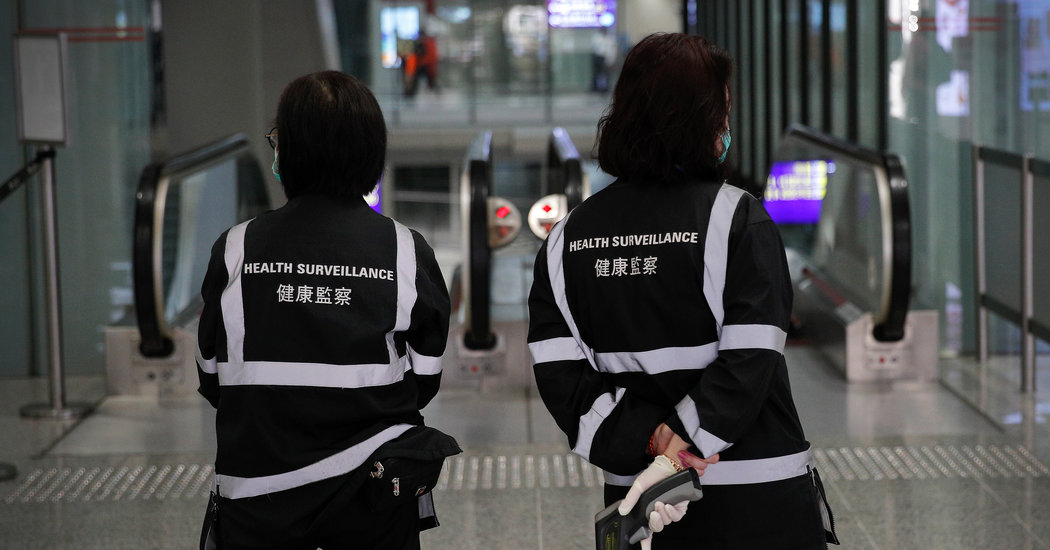
Researchers in China have identified a new virus that is behind a mysterious pneumonialike illness that has sickened 59 people in Wuhan and caused a panic in the central Chinese region.
There’s no evidence that the virus, a coronavirus, is readily spread by humans, and it has not been tied to any deaths. But health officials in China and internationally are watching it carefully, as it comes from the same region where the deadly SARS epidemic broke out in the early 2000s.
Experts said the pathogen that caused these unexplained pneumonia cases had been “initially identified” as a new coronavirus, China’s state broadcaster, China Central Television, said on Thursday. They detected this virus among 15 of the people.
The new coronavirus “is different from previous human coronaviruses that were previously discovered, and more scientific research is needed for further understanding,” CCTV said in its report.
Coronaviruses are a large family of viruses that infect animals and people. Some cause only the symptoms known as the common cold — although many other viruses also do that.
The Wuhan government confirmed on Dec. 31 that health authorities were treating dozens of cases of pneumonia of unknown cause. Symptoms of the new illness include high fever, difficulty breathing and lung lesions, the Wuhan health commission has said. No deaths have been reported, but seven people have become critically ill. On Wednesday, the local health commission said eight people had been discharged.
The revelations set off a panic in a country where the memory of the SARS outbreak remains fresh. SARS, a dangerous respiratory disease and also a coronavirus, spread from southern China in 2003 and infected more than 3,000 people, killing 774.
The new illness appeared just weeks before the Spring Festival, the country’s biggest holiday, when hundreds of millions of people travel. The authorities have urged the public to be on alert for pneumonialike symptoms like fevers, body aches and breathing difficulties.
Until Thursday’s announcement, it was not clear what was causing the illnesses in Wuhan. The World Health Organization said Wednesday that it had concluded that it was most likely a coronavirus. “More comprehensive information is required to confirm the pathogen,” the W.H.O. said in a statement.
Early reports on ProMED, a disease-alert service, said there was no evidence of human-to-human transmission.
Last weekend, laboratory tests in China ruled out SARS; the deadly Middle East Respiratory Syndrome, or MERS; the flu; bird flu; adenoviruses; and other common pathogens that cause pneumonia.
The initial cases of pneumonia were linked to workers at a market in Wuhan that sold live fish, animals and birds. Workers disinfected and shut down the market in Wuhan after the city health department said it traced many of the cases to it.
Health authorities in Asia have stepped up screenings and isolated patients with flulike symptoms who have traveled to Wuhan. In Hong Kong, eight people with fever and respiratory symptoms who had traveled recently to Wuhan were hospitalized as of Wednesday.
In South Korea, the authorities said on Wednesday that they had put a Chinese woman under isolated treatment after she was found to have pneumonia after trips to China, including Wuhan.
In Singapore, the authorities placed a Chinese girl with pneumonia in isolation because she had traveled to Wuhan, then said on Sunday that doctors had found that the child had a common childhood viral illness.
Officials in Hong Kong have installed additional thermal imaging systems at its airport to monitor passengers coming from Wuhan, scanning for people with fevers.
SARS is believed to have jumped to humans from live-animal markets. It was eventually traced to civet cats, raccoon dogs and some other species that were raised and slaughtered for the exotic food trade. The virus normally circulates in bats, and the animals may have gotten it from them, possibly from eating food contaminated by bat droppings.
Most outbreaks of MERS, which appeared in 2012, have been traced to people who raise or sell camels, which are kept in the Middle East for meat, milk, racing, hauling cargo and as pets. Like SARS, it can jump from person to person, particularly in hospitals. Some patients infected many others after they were put on machines to help them breathe — the mechanisms helped spew viral particles into the air as they exhaled.
Virologists want to know which patients tend to get the virus, what symptoms they show, what animals — if any — the virus has been found in and what behavior helped the virus jump from animals to humans.
And they want to quickly figure out what countermeasures, such as antiviral drugs or breathing machines, help treat the illness.
[Like the Science Times page on Facebook. | Sign up for the Science Times newsletter.]

